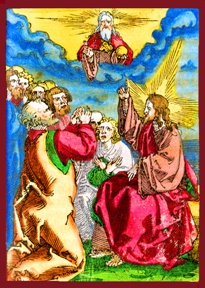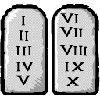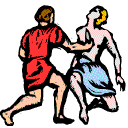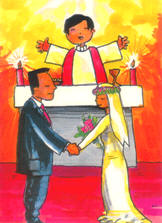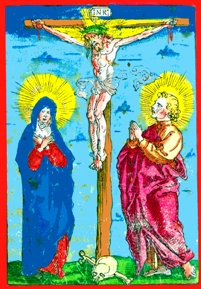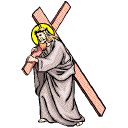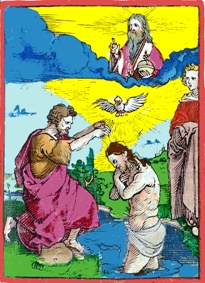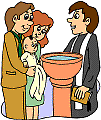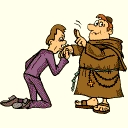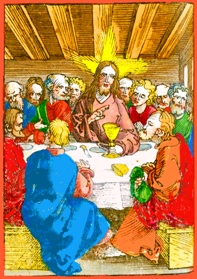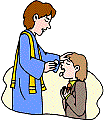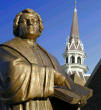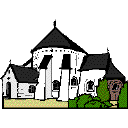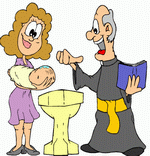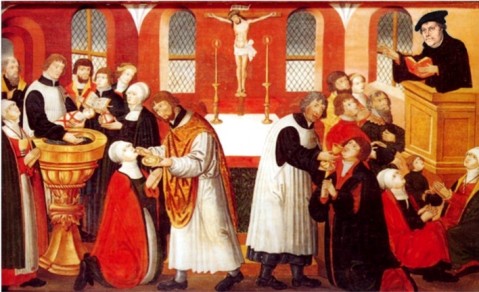Martin Luther to all faithful and godly
pastors and preachers: Grace, mercy, and peace in Jesus
Christ, our Lord.
The deplorable, miserable
condition which I discovered lately when I, too, was a
visitor, has forced and urged me to prepare this Catechism,
or Christian doctrine, in this small, plain, simple form.
Mercy! Good God! what manifold misery I beheld! The common
people, especially in the villages, have no knowledge
whatever of Christian doctrine, and, alas! many pastors are
altogether incapable and incompetent to teach. Nevertheless,
all maintain that they are Christians, have been baptized
and receive the holy Sacraments. Yet they cannot recite
either the Lord's Prayer, or the Creed, or the Ten
Commandments; they live like dumb brutes and irrational
hogs; and yet, now that the Gospel has come, they have
nicely learned to abuse all liberty like experts. O ye
bishops! what will ye ever answer to Christ for having so
shamefully neglected the people and never for a moment
discharged your office? You are the persons to whom alone
this ruin of the Christian religion is due. You have
permitted men to err so shamefully; yours is the guilt; for
you have ever done anything rather than what your office
required you to do. May all misfortune flee you! You command
the Sacrament in one form and insist on your human laws, and
yet at the same time you do not care in the least whether
the people know the Lord's Prayer, the Creed, the Ten
Commandments, or any part of the Word of God. Woe, woe, unto
you forever!
Therefore I
entreat you all for God's sake, my dear sirs and brethren,
who are pastors or preachers, to devote yourselves heartily
to your office, to have pity on the people who are entrusted
to you, and to help us inculcate the Catechism upon the
people, and especially upon the young. And let those of you
who cannot do better take these tables and forms and impress
them, word for word, on the people, as follows:- In the
first place, let the preacher above all be careful to avoid
many kinds of or various texts and forms of the Ten
Commandments, the Lord's Prayer, the Creed, the Sacraments,
etc., but choose one form to which he adheres, and which he
inculcates all the time, year after year. For young and
simple people must be taught by uniform, settled texts and
forms, otherwise they easily become confused when the
teacher to-day teaches them thus, and in a year some other
way, as if he wished to make improvements, and thus all
effort and labor is lost.
Also our blessed fathers
understood this well; for they all used the same form of the
Lord's Prayer, the Creed, and the Ten Commandments.
Therefore we, too, should teach the young and simple people
these parts in such a way as not to change a syllable, or
set them forth and repeat them one year differently than in
another.
Hence, choose whatever form you
please, and adhere to it forever. But when you preach in the
presence of learned and intelligent men, you may exhibit
your skill, and may present these parts in as varied and
intricate ways and give them as masterly turns as you are
able. But with the young people stick to one fixed,
permanent form and manner, and teach them, first of all,
these parts, namely, the Ten Commandments, the Creed, the
Lord's Prayer, etc., according to the text, word for word,
so that they, too, can repeat it in the same manner after
you and commit it to memory.
But those who are unwilling to
learn it should be told that they deny Christ and are no
Christians, neither should they be admitted to the
Sacrament, accepted as sponsors at baptism, nor exercise any
part of Christian liberty, but should simply be turned back
to the Pope and his officials, yea, to the devil himself.
Moreover, their parents and employers should refuse them
food and drink, and notify them that the prince will drive
such rude people from the country, etc.
For although we cannot and
should not force any one to believe, yet we should insist
and urge the people that they know what is right and wrong
with those among whom they dwell and wish to make their
living. For whoever desires to reside in a town must know
and observe the town laws, the protection of which he wishes
to enjoy, no matter whether he is a believer or at heart and
in private a rogue or knave.
In the second place, after they
have well learned the text, then teach them the sense also,
so that they know what it means, and again choose the form
of these tables, or some other brief uniform method,
whichever you like, and adhere to it, and do not change a
single syllable, as was just said regarding the text; and
take your time to it. For it is not necessary that you take
up all the parts at once, but one after the other. After
they understand the First Commandment well, then take up the
Second, and so on, otherwise they will be overwhelmed, so as
not to be able to retain any well.
In the third place, after you
have thus taught them this Short Catechism, then take up the
Large Catechism, and give them also a richer and fuller
knowledge. Here explain at large every commandment,
petition, and part with its various works, uses, benefits,
dangers, and injuries, as you find these abundantly stated
in many books written about these matters. And particularly,
urge that commandment or part most which suffers the
greatest neglect among your people. For instance, the
Seventh Commandment, concerning stealing, must be
strenuously urged among mechanics and merchants, and even
farmers and servants, for among these people many kinds of
dishonesty and thieving prevail. So, too, you must urge well
the Fourth Commandment among the children and the common
people, that they may be quiet and faithful, obedient and
peaceable, and you must always adduce many examples from the
Scriptures to show how God has punished or blessed such
persons.
Especially should you here urge
magistrates and parents to rule well and to send their
children to school, showing them why it is their duty to do
this, and what a damnable sin they are committing if they do
not do it. For by such neglect they overthrow and destroy
both the kingdom of God and that of the world, acting as the
worst enemies both of God and of men. And make it very plain
to them what an awful harm they are doing if they will not
help to train children to be pastors, preachers, clerks,
etc., and that God will punish them terribly for it. For
such preaching is needed. Parents and magistrates are now
sinning unspeakably in this respect. The devil, too, aims at
something cruel because of these things. Lastly, since the
tyranny of the Pope has been abolished, people are no longer
willing to go to the Sacrament and despise it. Here again
urging is necessary, however, with this understanding: We
are to force no one to believe, or to receive the Sacrament,
nor fix any law, nor time, nor place for it, but are to
preach in such a manner that of their own accord, without
our law, they will urge themselves and, as it were, compel
us pastors to administer the Sacrament. This is done by
telling them: Whoever does not seek or desire the Sacrament
at least some four times a year, it is to be feared that he
despises the Sacrament and is no Christian, just as he is no
Christian who does not believe or hear the Gospel; for
Christ did not say, This omit, or, This despise, but, This
do ye, as oft as ye drink it, etc. Verily, He wants it done,
and not entirely neglected and despised. This do ye, He
says.
Now, whoever does not highly
value the Sacrament thereby shows that he has no sin, no
flesh, no devil, no world, no death, no danger, no hell;
that is, he does not believe any such things, although he is
in them over head and ears and is doubly the devil's own. On
the other hand, he needs no grace, life, Paradise, heaven,
Christ, God, nor anything good. For if he believed that he
had so much that is evil, and needed so much that is good,
he would not thus neglect the Sacrament, by which such evil
is remedied and so much good is bestowed. Neither will it be
necessary to force him to the Sacrament by any law, but he
will come running and racing of his own accord, will force
himself and urge you that you must give him the Sacrament.
Hence, you must not make any
law in this matter, as the Pope does. Only set forth clearly
the benefit and harm, the need and use, the danger and the
blessing, connected with this Sacrament, and the people will
come of themselves without your compulsion. But if they do
not come, let them go and tell them that such belong to the
devil as do not regard nor feel their great need and the
gracious help of God. But if you do not urge this, or make a
law or a bane of it, it is your fault if they despise the
Sacrament. How could they be otherwise than slothful if you
sleep and are silent? Therefore look to it, ye pastors and
preachers. Our office is now become a different thing from
what it was under the Pope; it is now become serious and
salutary. Accordingly, it now involves much more trouble and
labor, danger and trials, and, in addition thereto, little
reward and gratitude in the world. But Christ Himself will
be our reward if we labor faithfully. To this end may the
Father of all grace help us, to whom be praise and thanks
forever through Christ, our Lord! Amen.
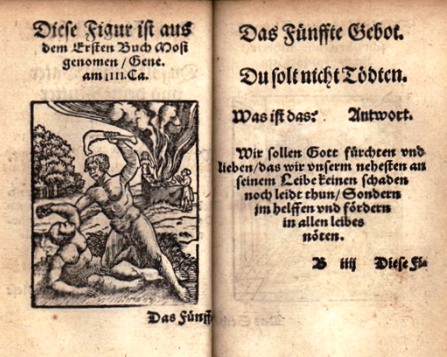
.jpg)


